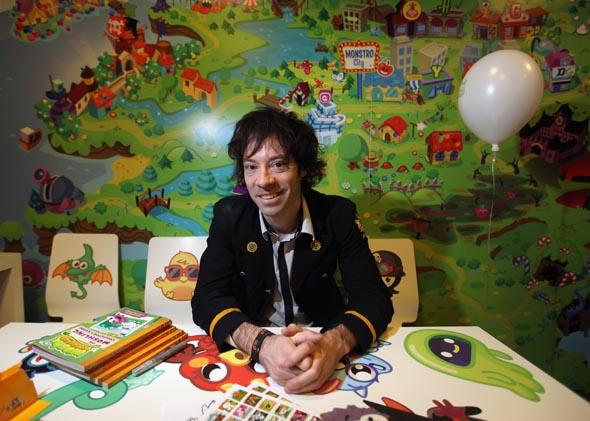Located above the Old Street Underground Station, London’s “Silicon Roundabout” is a concrete eyesore. Beyond the asphalt and exhaust fumes, motorists will likely remember the circular traffic junction for its flourish of urban sculpture—essentially two arches supporting a four-sided billboard. The rather uninspiring scene does little to signal to commuters that they are entering the epicenter of the United Kingdom’s burgeoning tech sector.
In recent years, startups have proliferated throughout the city, helping turn London into one of Europe’s digital capitals. “A few years ago, all of us were saying that Berlin would become the leading European tech hub, not London,” says Stian Westlake, the head of research at the innovation foundation Nesta. “I don’t think that is the case today.”
London’s bid to elbow past its rivals began to take shape around Old Street in the mid-2000s. It did so without formal government support or straightforward university anchoring. Creative people—including Mick Newton, CEO and founder of Livemusic, and Richard Moross, CEO and founder of custom-card service Moo.com— gravitated to the area of their own accord, drawn by cheap rents, lots of office space, and a plethora of pubs. Proximity to world-class universities gave startups easy access to programming and engineering talent: Imperial College and University College London are a short Tube ride away, while Cambridge and Oxford are both within 60 miles.
The scene hatched and nurtured businesses that later sold for millions. In 2007, CBS Interactive purchased music website Last.fm for $280 million. Two years later, Nokia bought Dopplr, a now defunct social networking service ($20 million), and in 2011 Twitter acquired TweetDeck, the social media dashboard application ($40 million). By 2008, 15 tech companies had clustered near the roundabout. In subsequent years they spiraled outwards throughout East London, or, as the government now likes to call it, “Tech City.” In 2010 the area could claim 200 tech companies. Today it is home to more than 1,500.
In November 2010, the British government decided it was time to dive in. Prime Minister David Cameron announced plans to transform East London into a tech hub that could steal some of Silicon Valley’s thunder. It would stretch from Old Street to ultra-hip Shoreditch—the Williamsburg of London—and on to the Olympic Park. “We are firmly on the side of the high-growth, highly innovative companies of the future,” Cameron said. In April 2012, the Seed Enterprise Investment Scheme launched, giving investors a 50 percent tax reduction on the first 100,000 pounds of seed investment and exempting their profits from capital gains tax—making it one of the most generous early-stage tax breaks in the world.
That measure, along with generous R&D tax breaks and a streamlined entrepreneur visa process, has fueled growth. Today digital industries in the U.K. generate 86 billion pounds every year, or about 11 percent of Britain’s gross domestic product. According to a report from the Boston Consulting Group, the U.K. is the world’s most “Internet-based major economy”—one that is growing at a rate of 10.9 percent a year, which outpaces a 5.4 percent projection for the U.S. and 6.9 percent for China.
Alastair Mitchell can see change unfolding around him and not merely because his office overlooks Old Street station. Six years ago he co-founded Huddle, a cloud content collaboration service. Since 2007, more than 100,000 businesses, governments, and federal agencies—including Kia Motors, Panasonic, NASA, and governments in Belgium, Greenland, and Italy—have adopted his software. Year-on-year revenues are up 100 percent, and he no longer faces the funding crises that nearly shut his business in its early days. “We would hit the summer and wealthy venture capitalists would go on vacation,” he says. “That’s fine if you’re an investor. But if you’re a small business you could go bust.” Fortunately Tech City has created a center of gravity that keeps the suits in orbit. Now, Mitchell says, money is chasing good ideas rather than the other way around.
Yet compared with Silicon Valley, Tech City is still a bit player. According to Dow Jones VentureSource, startups in London raised about $350 million in the first six months of 2013, which is just 10 percent of the money invested in companies in California over the same period. But that lopsided comparison may actually encourage more investment. Patrick Chung, a partner at New Enterprise Associates in Menlo Park, Calif., has been investing in London tech startups for six years and understands the dismissive attitude of some American VCs. “People do look at Tech City as small fry, if they have even heard of it,” he says. “Therefore it is a big opportunity because it is simply less well-trod ground.”
The Indian Angel Network might agree. In November, IAN—which involves more than 250 of India’s leading businesspeople—announced that it would open its first investment office outside of India in Tech City. It’s poised to pour millions of pounds into London coffers in the coming years. “Tech City is gaining fame and building a reputation amongst people in India,” says Padmaja Ruparel, the group’s president. “It is being viewed as the new place for startups.”
Tom Hulme, an angel investor who has interests in 21 different startups, says London has a practical advantage over other tech hubs. As both the political and entrepreneurial hub of the U.K., it simply makes life easier for investors. “One of the reasons I choose to live my life in London is I’m in close proximity to different constituents,” Hulme says. “All that I do is within a 30-minute cycle of my office, whereas in the States I would need to fly to D.C. for a politician, New York for a big brand, and Silicon Valley for tech startups. I liken London to a Petri dish that is going to grow some great stuff.”
Corporate giants are swarming the dish. In March 2012, Google opened Campus, a seven-story center and workspace for startups and entrepreneurs. In its first year, more than 60,000 people attended more than 850 courses, workshops, and drinks nights hosted in the building; today more than 100 startups use the facility as their permanent home.
Where Google goes, Facebook tends to follow: Last fall, Facebook opened its first office outside of the U.S. in London’s Covent Garden. It joined a raft of companies including Amazon, Cisco, IBM, Intel, and Microsoft that had also recently expanded their commitments and interests in Tech City. This past October, Rekoo, Asia’s largest social gaming company, announced it would build its first base outside of China in Tech City.
Despite the progress, London needs at least one high-profile exit—on the scale of a Facebook or a LinkedIn—to help push its tech sector to the next level. As PayPal’s Peter Thiel can attest, entrepreneurs who cash out become the investors who fund the next generation of startups and offer much-needed advice.
King, the online games giant that started in London, has experienced steady growth over the past decade and is expected to post sales of $1 billion in 2013, which is nearly double its revenues in 2012. The explosion has been fueled largely by the runaway success of the addictive online game Candy Crush Saga, which has been downloaded more than 1 billion times. But King, a bona fide homegrown success story, has decided to list its initial public offering in New York rather than London. As Mitchell of Huddle told me, “If you take identical companies with the same business model but place them in London and San Francisco, the U.S.-based company will raise twice as much money twice as fast and receive twice as high the valuation.” (To keep local businesses on local soil, the London Stock Exchange has made moves to ease the route to listing; this includes reducing the amount of equity that a company must sell from 25 percent to 10 percent.)

Photo by Oli Scarff/Getty Images
Perhaps the most promising London candidate for an IPO is Mind Candy, the online gaming firm behind the children’s website Moshi Monsters. The site’s 80 million registered users adopt brightly colored monsters—such as a monkey ninja named Chop Chop and a shaggy blob named Scarlet O’Haira—and explore Moshi, a virtual world. In 2012 it expanded its staff by 80 percent and saw revenues soar by 60 percent to 47 million pounds (about $75 million). Its Moshi Magazine became the best-selling children’s magazine in the U.K., and a movie is now in the works. It has even had toys in McDonald’s Happy Meals. Energy and optimism abounds at Moshi HQ, where employees conduct meetings in treehouses and transfer between floors using a slide rather than an elevator.
The U.K. government hopes to spread the good cheer to other startups. As part of a 50 million pound regeneration of East London, officials will raze the urban sculpture at the Silicon Roundabout and replace it with “Europe’s largest indoor civic space.” It will include classrooms, co-working spaces, and the latest 3-D printing technology for use by local startups, all housed in a futuristic cube. The Silicon Roundabout will finally have a worthy centerpiece. Less certain, though, is whether it will have a billion-pound valuation to go along with it.
